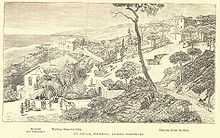Brummana
| Brummana برمانا | |
|---|---|
| City | |
.jpg) | |
 Brummana | |
| Coordinates: 33°51′57″N 35°35′42″E / 33.8659°N 35.5950°ECoordinates: 33°51′57″N 35°35′42″E / 33.8659°N 35.5950°E | |
| Country |
|
| Governorate | Mount Lebanon Governorate |
| District | Matn District |
| Highest elevation | 800 m (2,600 ft) |
| Lowest elevation | 700 m (2,300 ft) |
| Time zone | EET (UTC+2) |
| • Summer (DST) | EEST (UTC+3) |
| Dialing code | +961 |

Brummana (Arabic: برمانا) is a town in the Matn District of the Mount Lebanon Governorate in Lebanon. It is located east of Beirut, overlooking the capital and the Mediterranean.
Overview
As most of the villages, Brummana has an Aramaic name which most probably means house of Rammana, the God of Air, Storm and Thunder: In the location where Brummana was built it was thought that the god “Raymond” in Aramaic or “Ramano” in Assyrian lived in, which gave the name “Beit Roumana” (or House of Roumana), and it is known that the letter B at the beginning of the name of villages refers to “Beit” in Arabic meaning “House” in English.
Climate
Summer is usually dry in Brummana and begins in early May and ends in mid-October. Summer temperature rarely exceeds 30 deg C, with a lower limit of around 20°C (68°F). Its relative humidity in summer runs at 68%. Winter is wet and mild with temperatures ranging between 5 and 18 deg C, with the occasional snowfall.
Demographics
Brummana is home to various religious groups, although Christians, mostly Greek Orthodox make up 49% ,and Maronite Catholic make up 51% of the population, with Druze making a substantial minority.[1] The town is also the summer home of Arab tourists from the Persian Gulf area, mostly from Kuwait, the United Arab Emirates, and Saudi Arabia. There is also a very old Greek Orthodox church in Brummana, the Church of the Prophet Cha'ya (Isaiah), it was originally a fort of Byzantine origin around 1,500 years old, but was turned into a church in the 7th century. Eighty years ago, when Maronites fled from the north and settled in Brummana, the church had to be divided. It is now half Greek Orthdox and half catholic.
Education
The most renowned educational institute in Brummana is Brummana High School, which was founded by the Quaker, Theophilus Waldmeier in 1873. The school influenced the inhabitants of Brummana and gave the town some English traditions, such as the five o’clock tea.[2]
Theophilus Waldmeier (Swiss) 1832–1915: Theophilus Waldmeier, was born in 1832 in Basle, Switzerland. He attended the missionary college of St Crischona, near Basle, and went to Abyssinia as a missionary in 1858. After being among a motley assortment of Europeans held prisoner by the mad Ethiopian King Theodore and rescued in the nick of time by General Napier and his British troops at the siege of Magdala; he left in 1868 and went to Syria, settling at Beirut in connection with the British Syrian Mission founded in 1860. He re-embarked on a second career of good works. Among the fruits of that career are two of Lebanon's most vigorous institutions—Brummana High School, and Asfuriya Mental Hospital, founded in 1894.
The Swiss Missionary Theophilus Waldmeier moved his half-Ethiopian wife and his eight children by horseback up the steep mountain path from Beirut to Brummana where he started the Friends' Syrian Mission in 1873. In 1874, he traveled to Europe to seek financial backing from the Society of Friends. After listening to his impassioned plea for aid, some British and American Quakers formed a committee which, from that time until today, has provided support for the Brummana School.
Etymology
The name of the town, Brummana, stems from the Aramaic. The name most probably means House of Rammana, which was the god of air, storm and thunder. It was believed during Antiquity that Rammana lived in the area that is now Brummana, and thus the area became known as Beit Roumana (or House of Roumana) and later corrupted to Brummana.
Tourism
Brummana is one of Lebanon's main summer resorts due to its relatively cool climate. Sitting on top of a pine-forested hill, the town offers visitors spectacular views over Beirut, the Mediterranean coast, and the surrounding mountainous area. It attracts many Lebanese for day and weekend trips. Brummana also attracts thousands of Arab tourists from the Persian Gulf every summer, eager to escape from the hot and arid climate of the Persian Gulf. The population of Brummana rises to about 60,000 during the summer months, from a low of about 15,000 in winter, when the weather is cold and often snowy.[3]
Families of Brummana
The main families that currently reside in Brummana are Karam, Aouad, Rizk, Maksad, Kanaan, Aswad, Batrouni, Bechara, Njeim, El Hayek, Tawil, Abi Samra, Abi hamadand, Mazloum, Younes, Ziadé's family and sons, Zamora family.
Places
Brummana has many hotels like Grand Hills Hotel, Brummana Hotel, Kanaan Hotel, Le Crillion, Printania Hotel, Garden Hotel... Brummana is also filled with many restaurants like Crepaway, La Gargotte, Burj Al Hammam, Mounir, Fakhreddine...
References
| |||||||||||||||||
